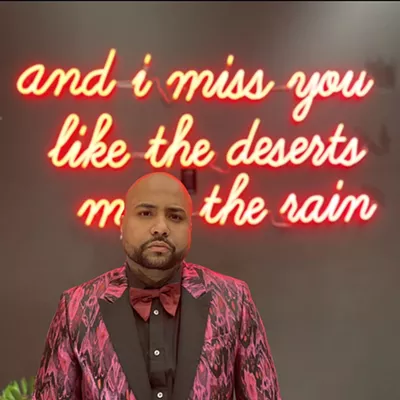Dean and Britta as a musical project is in many ways a stripped-down, back-to-basics endeavor--it hearkens back to a time when pop music was more about the performance and interpretation of songs, when musicians would sing each other's songs because it was the songs themselves they loved and wanted to re-create.
Their first release, L'Avventura (Jet Set, 2003), was composed entirely of covers of classic French and folk songs, and their second album, 2007's Back Numbers (Zöe), was a mix of covers and originals. Dean and Britta embrace a contemporary musical aesthetic, with electronic sounds and modern ambiance, while singing songs from Lee Hazlewood, Donovan and Buffy Sainte-Marie.
This sort of simplification and reinvention of older pop styles can also be seen as Wareham's response to all that came before. Luna announced they were breaking up in 2005, shortly before the release of their last album, Rendezvous, when the turmoil of the band's existence became too much to maintain. The 2006 documentary, Luna: Tell Me Do You Miss Me, follows the band in the final days and painstakingly reveals the pressures and frustrations Luna was enduring. (There's even a scene in which guitarist Sean Eden whines, "I'm in a bunk bed in Tucson," as if it's the worst thing ever.)
In addition, not long after Phillips joined the band, Wareham and Phillips became romantically involved, which led to Wareham divorcing his first wife. Wareham has written a memoir, Black Postcards: A Rock and Roll Romance (forthcoming from Penguin this March), that documents and explores what it's like to be in rock bands that are better than their success might suggest, and how one's personal life inevitably influences and affects the music.
With all of this history, Dean and Britta's music becomes even more infused with a sense of both romanticism and reality.
The day I talked to Wareham on the phone, he admitted he'd had a hectic day. While preparing for Dean and Britta's tour, he got stuck in an elevator in the band's practice space, and had to climb out. "We'll have to carry our equipment down the stairs tomorrow," he said. Frustrations with touring helped lead to the end of Luna, so I asked Wareham if touring now is better than it was before.
"I guess you get used to it," Wareham said. "On the first Dean and Britta tour, when we were loading stuff into the van, I couldn't believe I was doing it. ... It's grueling sometimes. We just did a little European tour with zero crew, 14 shows in 15 days, driving everyday, selling T-shirts after the show, but it didn't kill us. It was kind of fun."
It seems somehow strange but also admirable for a musician like Wareham, whose music has influenced numerous bands, to have to carry his own equipment down the stairs and be his own tour manager in Europe. But it's these kinds of realities of being in a band that seem to both frustrate and invigorate Wareham--the fact that he's still just another guy in a band is testament to his status as a real musician, from an era of rock 'n' roll that seems somehow in the past but is also still alive in the form of Dean and Britta: professional, talented and seasoned musicians who are also down to earth.
This kind of balance became even more evident as Wareham continued talking about the preparations for this tour, and how difficult it was to make the songs sound good. But Dean and Britta tour as a full band precisely because it sounds good. Wareham pointed out that "we could probably make more money if we went as the two of us and lowered our expenses, but things sound a lot better with a band."
Part of what made Galaxie 500 and Luna influential was both bands' ability to create music that sustained a certain pop energy. In Black Postcards, Wareham writes of Luna, "We played a kind of spacey twin-guitar rock 'n' roll--with the 'roll' being just as important as the 'rock.'" As Dean and Britta, Wareham and Phillips maintain that spacey feel through electronic sounds courtesy of Sonic Boom, and that rolling feel through re-creations of a nostalgic sound.
"Maybe it begins with a drummer who plays with sensitivity," said Wareham when I asked how Dean and Britta maintain that same sort of "roll." "I don't know. We love old records where the drums are mixed really low: old sounds, old snare sounds."
So part of what creates that "roll" is singing songs from those old records. Said Wareham, "Generally, we pick songs that are kind of obscure, I guess. Something like, 'That's a great song; more people should hear that,' or maybe, 'That's a great song, and we think we can do a little better, sometimes.'
"What I like about it is, when you're planning to make a record, you can pick five songs that are already written, other people's songs--you can pick really good songs, and then you only have to write five or six yourself," Wareham continued. "It's much easier to put together a collection of really good songs if you just write half of them yourself. It's hard to write 12 new songs year after year. Maybe that sounds lazy of me, but to come up with 12, you've really got to write 15 or 17. And I like singing someone else's songs when the lyrics are already written: You can really get into it and put more of yourself into it, oddly, than you would do with your own lyrics that you're still not sure that you quite like, or how they should go, or how the melody should be. Before the Beatles, that's what everyone did. Maybe the world would be a better place if all these bands didn't feel compelled to write their own songs."
Dean and Britta's foundation is wise and stable in its simplicity, and makes their albums, shows and life as a band better.
(For an expanded version of this article, visit TAMMIES.com.)














